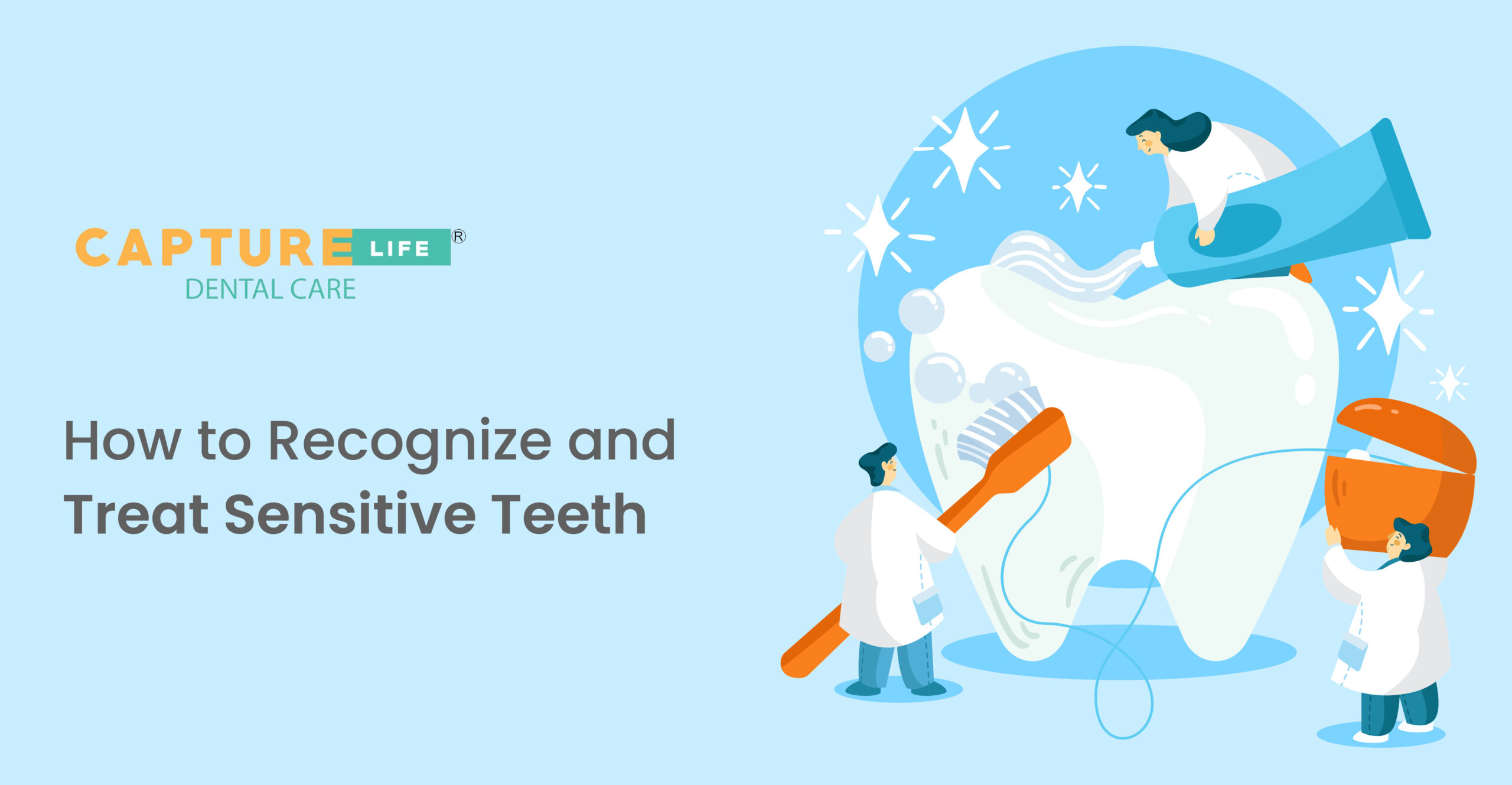
25 Nov Say Goodbye to Tooth Sensitivity with These Treatments
How to Recognize and Treat Sensitive Teeth
Dealing with sensitive teeth can make everyday activities like eating, drinking, or even breathing in cold air uncomfortable.
Tooth sensitivity, often described as a sharp, sudden pain, occurs when the underlying dentin of the tooth becomes exposed.
Understanding the signs of tooth sensitivity and knowing how to treat it can improve your quality of life and protect your dental health.
At Capture Life Dental Care, we’re here to help you manage tooth sensitivity and keep your smile healthy.
Recognizing Tooth Sensitivity
Tooth sensitivity occurs when the enamel that protects your teeth becomes thinner, or when gums recede, exposing the softer layer beneath, called dentin.
Dentin contains tiny tubules that connect to the tooth’s nerve center, and when exposed, it can trigger pain when in contact with certain stimuli. Here are common signs of sensitive teeth:
- Sharp Pain When Eating or Drinking Hot, Cold, Sweet, or Acidic Foods: If you experience discomfort or pain when consuming temperature-sensitive or sugary foods, this is one of the clearest signs of tooth sensitivity.
- Discomfort During Brushing and Flossing: Some people experience pain while cleaning their teeth, especially near the gum line where enamel is thinner, or the dentin is exposed.
- Sensitivity to Cold Air: Breathing in cold air, especially during the winter months, can cause sharp pain if your teeth are sensitive.
- Pain When Eating Certain Foods: Crunchy or hard foods may aggravate sensitive teeth, causing discomfort as they press on the exposed dentin.
If you notice any of these symptoms, it’s important to seek professional dental care to rule out underlying issues like tooth decay, gum disease, or enamel erosion.
Causes of Tooth Sensitivity
Several factors can contribute to tooth sensitivity. Here are some of the most common causes:
- Enamel Erosion: Acidic foods and drinks, such as soda, citrus fruits, and vinegar, can wear away tooth enamel over time, exposing the dentin underneath.
- Gum Recession: Gum disease or aggressive brushing can cause gums to recede, exposing the sensitive roots of the teeth.
- Tooth Decay or Cavities: Untreated cavities can lead to tooth sensitivity as the protective enamel is compromised.
- Teeth Grinding (Bruxism): Grinding your teeth, especially during sleep, can wear down enamel and make teeth more sensitive.
- Whitening Treatments: Some over-the-counter whitening products can cause temporary sensitivity by irritating the tooth’s nerves.
Treating Sensitive Teeth
Fortunately, there are several ways to manage and treat tooth sensitivity. The best approach depends on the cause of your sensitivity, so it’s important to consult with a dentist for a proper diagnosis. Here are some common treatments for sensitive teeth:
- Use Desensitizing Toothpaste: Desensitizing toothpaste contains compounds that help block the pain signals from traveling to the tooth’s nerve. Regular use can reduce sensitivity over time.
- Switch to a Soft-Bristled Toothbrush: Using a soft-bristled toothbrush and brushing gently can help protect your enamel and prevent further damage. Avoid aggressive brushing, which can wear down enamel and lead to gum recession.
- Fluoride Treatments: Dentists may apply fluoride varnish to sensitive areas to strengthen enamel and reduce sensitivity. This can be done in-office or at home with prescribed fluoride toothpaste or gels.
- Avoid Acidic Foods and Drinks: Reducing your intake of highly acidic foods and beverages can help prevent further enamel erosion. If you do consume acidic items, rinse your mouth with water afterward or wait 30 minutes before brushing to protect your enamel.
- Dental Procedures: If your sensitivity is due to gum recession, your dentist may recommend procedures such as bonding agents or gum grafting to cover the exposed roots. In severe cases, a root canal may be necessary to treat the underlying nerve.
Preventing Tooth Sensitivity
Prevention is key to avoiding tooth sensitivity. Here are some tips to keep your teeth protected:
- Maintain Good Oral Hygiene: Brush twice a day with fluoride toothpaste, floss daily, and visit your dentist regularly for cleanings and check-ups.
- Use a Mouthguard: If you grind your teeth, consider wearing a mouthguard at night to protect your enamel.
- Avoid Overuse of Whitening Products: Use teeth whitening products with caution, and consult your dentist before starting any treatment.
Conclusion
Sensitive teeth don’t have to disrupt your life. By recognizing the signs early and taking steps to protect your enamel and gums, you can reduce discomfort and prevent further sensitivity.
At Capture Life Dental Care, we’re dedicated to helping you manage tooth sensitivity with personalized treatment plans that cater to your unique needs.
If you’re struggling with sensitive teeth, contact us today for expert care and advice.

